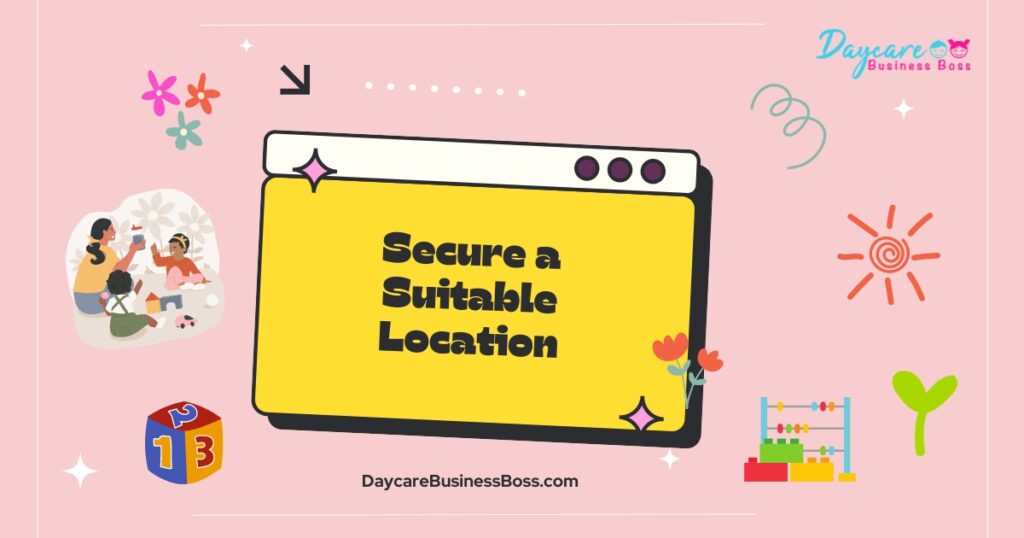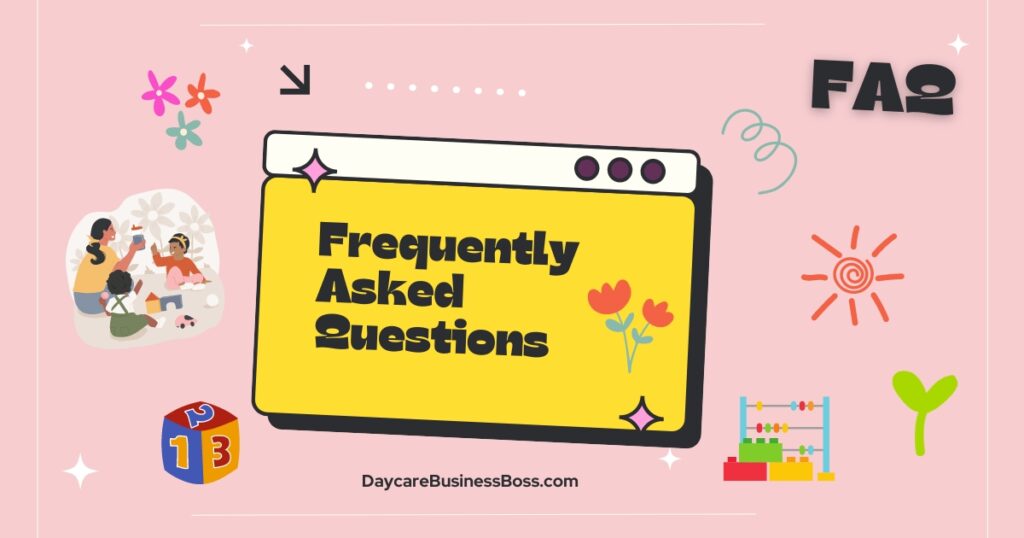Starting your own daycare business is a fulfilling and transformational experience. Starting a daycare is about more than just starting a business; it’s about nourishing young minds, supporting growth, and establishing a secure place for children to study and play. A well-structured plan and a heart dedicated to providing great care will be your guiding light as you enter the world of early childhood education and entrepreneurship.
To start a daycare, you should research licensing requirements, create a business plan, secure a suitable location, design a safe and engaging environment, hire qualified staff, set policies, and promote your services locally.
In this article, we will delve into the crucial stages and factors that will pave the road for the launch of your daycare. So, let us go on this illuminating journey, where knowledge, compassion, and business acumen will collide to create the future for both you and the children you will serve.
Research Licensing Requirements
Starting a daycare business is an exciting enterprise, but it involves careful planning and attention to legal requirements. Before jumping in, it is critical to undertake extensive study and obtain a thorough understanding of the licensing requirements in your jurisdiction. The regulatory landscape can be complex and complicated, involving a wide range of key concerns.
Staff-to-child ratios, safety protocols, adherence to health laws, and extensive background checks are all important factors to consider when applying for a license. These standards are in place to ensure the safety and development of the children in your care. Understanding these requirements not only ensures that your company functions lawfully, but it also indicates a dedication to providing a safe and caring environment for children.
Compliance with all legal duties is a critical component of running a daycare center. It necessitates precise attention to detail as well as a commitment to devote time and effort to aligning your activities with the criteria mentioned. Each aspect contributes to the overall well-being of the childcare center, from securing the necessary number of skilled staff members for the number of children to adopting severe safety measures and maintaining excellent hygiene.
Read more about: Zero-Cost Daycare Startup: Strategies for a Thrifty Daycare Launch
Create a Business Plan
A solid business plan serves as the foundation for the growth of your daycare operation. This complete blueprint necessitates a thorough examination of numerous aspects, including a clear explanation of your goal, vision, intended target audience, supplied services, and unique selling propositions. These elements work together to give a strategic direction for your activity.
The mission and vision statements capture the essence of your daycare’s mission and the future you want to create. They serve as a beacon of light, representing the principles and goals that underpin your activities. Identifying your target market entails conducting a thorough review of demographics, parental needs, and local demand to ensure that your services are in line with the needs of the community you intend to serve.
Extending on the services you want to offer and emphasizing your unique selling qualities set your childcare out from the competition. A specific curriculum, superior staff qualifications, or unique enrichment programs all contribute to your daycare standing out in a competitive landscape.
A thorough business plan, on the other hand, does not stop there. It digs into finance, providing extensive forecasts of both expenses and possible revenue streams. Construction, equipment, licensing, and beginning marketing costs must all be properly anticipated. The accuracy of operational expenses such as rent, utilities, salaries, and supplies must be examined.
Financial predictions based on market research and reasonable assumptions provide insight into your daycare venture’s potential profitability. This is especially important when applying for funding or loans from investors, banks, or other financial institutions. A well-structured business plan indicates your readiness, smart thought, and commitment to make your daycare a huge growth.
Secure a Suitable Location

The importance of selecting an ideal site for your daycare cannot be stressed; it is a critical aspect in determining the growth of your venture. A well-chosen location not only attracts potential clients but also contributes to your daycare facility’s general operation and safety.
One of the most important factors to consider when choosing a place is accessibility. Your chosen location should be convenient and easy to reach for your target audience, which is usually parents and carers. Analyze the surrounding area’s demographics to ensure that the site corresponds to the requirements and interests of the families you aim to serve. It is critical to follow local zoning restrictions to avoid potential legal complications that could stymie your business.
Another important consideration when analyzing potential venues is safety. Choose neighborhoods with low crime rates and decent traffic flow to ensure that parents and children may safely approach and exit the childcare premises. The proximity of your daycare to schools and residential neighborhoods is advantageous since it not only facilitates drop-offs and pickups but also increases your daycare’s presence in the community.
Transportation alternatives are also critical. A location accessible by public transportation or near major roads and highways might boost the convenience of your daycare for parents with diverse travel patterns.
The physical space itself necessitates serious thought. A welcoming learning and play environment necessitates plenty of indoor and outdoor space. Ample space is required for children to participate in activities that encourage physical, cognitive, and social development. Playgrounds, instructional centers, and quiet zones should all be accommodated within the available space.
Design a Safe and Engaging Environment
Creating a childcare atmosphere that seamlessly mixes safety, learning, and creativity is a critical component of creating an engaging experience for both children and parents. This space’s design necessitates careful consideration of numerous variables, ranging from safety concerns to appealing educational elements.
Safety comes first, and your daycare area must be thoroughly childproofed. Install safety precautions to protect against potential hazards, particularly those involving electricity and sharp items. Outlets should be covered, cords should be secured, and potentially harmful things should be kept out of reach. This not only safeguards the children in your care, but it also gives parents confidence that their children are in a safe environment.
Aside from safety, the design of your daycare should promote both learning and creativity. Divide the space into interactive learning zones that address various developmental needs. Make areas for reading, painting, science, and imaginative play. Arrange furniture and items in a way that encourages inquiry and participation.
Comfortable nap areas are critical for young children’s well-being. Create nap places that create a sense of calm and security, allowing youngsters to relax and recharge. A peaceful nap environment is enhanced by soft mats, comfy blankets, and soothing hues.
Special consideration should be given to the play area. Provide toys that foster imaginative play, cooperative activities, and individual exploration. Toys that enhance cognitive development, physical coordination, and social connection should be included.
Infuse engaging instructional resources into the environment. Display books, educational posters, and visual aids that stimulate children’s interest and encourage a love of learning. A diversity of textures, colors, and shapes can hold their interest and help them develop their sensory skills.
Read more about: Your Child’s Well-Being Matters: Mastering the Home Daycare Interview Checklist
Hire Qualified Staff
The quality and dedication of your personnel are critical to the growth of your daycare. They are the heart and soul of your organization, defining the experiences and development of the children in your care. When assembling your team, prioritize recruiting employees who not only have the qualifications but also have a strong desire to work with children.
In the hiring process, thoroughness is essential. Conduct thorough background checks, interviews, and reference checks to ensure that potential employees have a clean record and the appropriate characteristics for this demanding work. In addition to professional abilities, search for people who have patience, empathy, and a genuine interest in developing young brains.
Certifications are an important part of determining your staff’s skill and preparedness. Ascertain that your team members have received necessary training, such as CPR and first aid. These credentials are not only required by law in many countries, but they are also important skills that can make a major impact on the safety and well-being of the children in your care.
Professional development should be a continuous process. Create a program that offers regular training opportunities to help your employees improve their skills and knowledge. Early childhood education is a constantly evolving field, with new research and best practices emerging regularly. By investing in continuous learning, you enable your team to keep current on the latest techniques and approaches, thus benefitting the educational experience of the students.
It is also critical to cultivate a pleasant and collaborative team culture. Encourage open communication, mutual support, and collaborative learning among your employees. A well-coordinated team is better able to deal with obstacles, adjust to changing conditions, and create a constant and supportive atmosphere for the children.
Set Policies
The adoption of well-defined and thorough policies is critical to maintaining order and protecting the well-being of the children in your daycare. Crafting these policies necessitates careful consideration of numerous factors to establish a caring and secure environment.
Protocols for health and safety must take primacy. Procedures for cleanliness, hygiene, sickness management, and emergency response are detailed. Clear guidelines for providing medication, dealing with allergies, and keeping a clean environment are critical. Such policies ensure children’s health and well-being, ensuring parents that their children are in good hands.
Discipline rules should be carefully crafted, with an emphasis on constructive techniques that foster understanding and progress. Define acceptable behaviors, sanctions, and redirection strategies. This provides consistent and equitable responses to behavioral concerns, providing a learning environment for children.
Open communication with parents is essential in daycare operations. Establish policies for daily updates, progress reports, and communication channels. This transparency not only fosters trust but also keeps parents up to date on their child’s activities and development, resulting in a strong collaboration between your daycare and families.
Drop-off and pick-up procedures, attendance regulations, and scheduling are all covered by operational guidelines. These policies simplify daily operations and establish expectations for both parents and staff.
These policies’ transparency and dissemination are critical. Make them clear to parents at enrollment, personnel during onboarding, and any relevant regulatory authorities. Review and update policies regularly to keep up with changing circumstances and new best practices.
Promote Your Services Locally
Promotion is critical in attracting parents to your daycare, and a well-crafted marketing campaign may make all the difference in highlighting the value your daycare provides. Creating an effective strategy entails a mix of online presence, community interaction, and personalized experiences.
A quality website acts as your daycare’s virtual introduction. It’s a website where parents may learn about your services, employees, facilities, and overall childcare philosophy. To make a good first impression, use appealing visuals, helpful content, and simple navigation. Highlight the distinguishing aspects of your daycare, such as your curriculum, highly qualified personnel, or cutting-edge facilities.
Make use of social media to reach a larger audience. Create accounts on social media channels such as Facebook, Instagram, and Twitter to share insights, highlight everyday activities, and communicate with potential parents. Social media allows you to show off your daycare’s nurturing and educational environment while also facilitating direct engagement with potential families.
It is also critical to network inside your community. Attend neighborhood activities, collaborate with surrounding schools, and participate in community initiatives to foster relationships and a positive reputation. Word-of-mouth recommendations are frequently the most powerful form of endorsement, and a strong community presence can lead to a continuous stream of inquiries.
Offering open houses or trial sessions allows potential clients to have a firsthand look at your daycare’s environment. Parents may observe the care, learning opportunities, and safety precautions in action thanks to this individualized connection. It’s a great chance to answer questions, resolve concerns, and highlight the benefits your daycare provides to both children and parents.
Read more about: Web-Wise Childcare: Unveiling Daycare Center Marketing Techniques
Frequently Asked Questions

What are the most important licensing criteria for opening a daycare?
Staff-to-child ratios, safety standards, health restrictions, background checks, and first aid training are all common licensing requirements for daycares. Investigate your local requirements to ensure compliance and the creation of a child-safe environment.
How critical is a well-thought-out business plan?
A business plan is vital for the growth of a daycare. It contains your goal, offerings, target market, financial predictions, and operational strategies. It helps you make decisions, get funds, and demonstrate your dedication to potential investors or lenders.
How can I effectively market my daycare services in my community?
Creating a decent website, leveraging social media platforms, networking within your community, and highlighting your daycare’s unique perks are all part of promoting your daycare. Hosting open houses and trial sessions helps parents to have a firsthand look at your facility and its offers, generating trust and interest.
To learn more on how to start your own daycare checkout my startup documents here.
The information provided by DaycareBusinessBoss.com (“The Site”) is for general informational purposes only. All information on the Site is provided in good faith, however, we make no representation or warranty of any kind, express or implied, regarding the accuracy, adequacy, validity, reliability, availability or completeness of any information on the Site. Under no circumstance shall we have any liability to you for any loss or damage of any kind incurred as a result of the use of the Site or Reliance on any information provided on the Site. Your use of the Site and your reliance on any information on the Site is solely at your own risk.
This blog post is for educational purposes only and does not constitute legal advice. Please consult a legal expert to address your specific needs. Terms and Conditions. (https://daycarebusinessboss.com/terms-conditions/)

Meet Shawn Chun: Entrepreneur and Childcare Business Fan.
I’m a happy individual who happens to be an entrepreneur. I have owned several types of businesses in my life from a coffee shop to an import and export business to an online review business plus a few more and now I create online daycare business resources for those interested in starting new ventures. It’s demanding work but I love it. I do it for those passionate about their business and their goals. That’s why when I meet a childcare business owner, I see myself. I know how hard the struggle is to retain clients, find good employees and keep the business growing all while trying to stay competitive.
That’s why I created Daycare Business Boss: I want to help childcare business owners like you build a thriving business that brings you endless joy and supports your ideal lifestyle.

